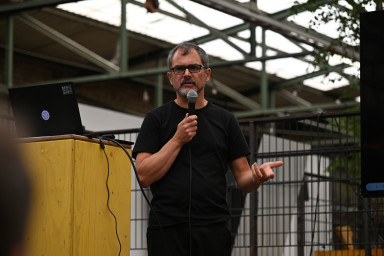01 Jul, 2024, 17:30Gleishalle Oberhafen
Prof. Fabio Gramazio (Gramazio Kohler Research, ETH Zurich)
Digital materiality

Image © Clara Mross.
Abstract
The lecture ‘Digital materiality’, given by Professor Fabio Gramazio, delves into the pioneering work conducted by Gramazio Kohler Research (GKR) at ETH Zurich, which Gramazio co-founded with Professor Matthias Kohler. It revolves around exploring the evolving demands in architectural production, catalysed by the integration of digital manufacturing techniques.
Central to GKR’s endeavours is the fusion of data and material and its profound implications for architectural design. Through an innovative approach, GKR have established a unique architectural expression and aesthetic by directly fabricating building components described on the computer. By seamlessly integrating material and production logic into the design process, they have broadened the horizons of construction possibilities.
The group’s research focuses on additive digital fabrication techniques for building non-standardized architectural components. By positioning material precisely where required, functional and aesthetic qualities become interwoven into a structure. In this way, it is possible to ‘inform’ architecture from the material level. Starting with modules of basic material such as bricks, GKR has expanded its investigative spectrum to include wood and clay, as well as concrete and other fluid materials.
During the lecture, Professor Gramazio will delve into the transformative realms of architectural innovation and digital fabrication techniques, focusing on past and current projects at the group.
About the lecturer
Fabio Gramazio has been a leading figure in the fields of computational design and digital fabrication in architecture. His research and practice have contributed significantly to advancing the use of computational and robotic technologies in the building industry. He and Matthias Kohler, together with the group around GKR, have lectured and exhibited their work worldwide and have received numerous awards for their contributions to the field.